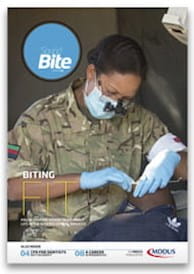THE move from final year dentist to vocational trainee can be quite an adjustment to make. Meeting your patients forms a significant part of this transition. Forging appropriate relationships and building trust and rapport can ease the initial stress.
Understanding your patients and adapting your communication style appropriately can help dramatically with this, as well as allowing you to identify and manage expectations – a key factor in patient satisfaction.
Interpersonal aspects of care
In practice, the clinical aspect of the dentistpatient relationship is a clear focus while the “softer” aspects of providing care can often be overlooked. As in most healthcare settings many patients visit their dentist with a certain degree of trepidation. They can be nervous, stressed and worried, and in this heightened emotional state can be more sensitive to the interpersonal aspects of the consultation.
At MDDUS we often advise on situations where patients have had a consultation that has seemingly gone well, with all of their clinical needs addressed, but something in the dentist’s or perhaps receptionist’s approach has triggered a complaint.
One recent complaint received on behalf of an MDDUS member involved a mother and her son who had presented for routine check-ups over a period of two years. Both had very good oral hygiene and as a result appointments had been handled quickly and without incident. It was with some surprise, therefore, when the dentist received a letter from her complaining of a “rushed and impersonal service”.
The patient had felt the dentist was not interested in them as patients, but only in getting them in and out the door as quickly as possible. Indeed, the mother said she had been keen to discuss braces for her son, but felt there was never an opportunity to open up a discussion with the dentist as they were dealt with so swiftly. The dentist always finished his consultation with: “All fine. Make an appointment at reception for six months”. He then turned away from the patient as they left the chair and room. The patient felt she had made it quite clear that she was poised to ask questions, but felt that the dentist had already psychologically moved on to the next patient and that this was her being “dismissed”.
This demonstrates where the functional aspects of a consultation have been fulfilled but the personal needs of the patient have somehow or other not been met. Such personal needs might include feeling: welcome, understood, comfortable, secure, and listened to. The NHS Constitution and The Charter of Patients’ Rights and Responsibilities spell out the importance of communication, participation, respect and compassion and also emphasise the need for feedback and patient participation.
Active listening
Building trust and rapport with patients can help fulfil these areas and a key aspect of this is simply listening. Listening can be difficult to do well, particularly in a time-pressured environment or when you are new to practice.
Consider these points:
- Listen through the patient’s words for the key themes, needs and messages.
- Stay in the interaction: pay full attention to the patient.
- Be aware of stereotyping and making assumptions.
- Observe the non-verbal communication: what’s their body language saying?
- Give signals to show you’re listening: eye contact, nods, encouraging noises.
- Use appropriate questioning: clarification, exploring, interpreting.
- Summarise what the patient is saying and reflect it back to them.
- Avoid jargon: use language which is easily understood; use diagrams.
- Agree a collaborative way forward: reasoning, methods, timescales, reviews.
- Encourage feedback: seek feedback and encourage questions (“Is there anything else…?”)
All of this can equally be applied to the dental team as well as patients. Information gleaned from team members can greatly inform your interaction with patients. An experienced nurse can be invaluable and give the newly qualified dentist a helpful steer with patient knowledge and associated behaviours – which patient needs a bit more time or information, who is particularly nervous, or even simple things that just smooth an interaction like how a patient likes to be addressed.
GDC principles
Patients can find healthcare interactions confusing and the volume of information overwhelming, making it difficult for them to question or seek clarification on treatment. Costs can also be an issue for those facing financial pressures. Reluctance to question and feedback can trigger issues around key risk areas including: communication, consent, treatment planning and diagnosis.
The first three GDC principles are:
- Put patients’ interests first
- Communicate effectively with patients
- Obtain valid consent
These are all heavily dependent on effective communication. Listening well and employing clarity and transparency with your patients will aid your communication and allow you to create a fuller picture, which will in turn allow you to adopt an individualised approach. A holistic view can be developed of a patient’s overall health, reactions to treatment proposals and any concerns they may have – this will ultimately allow you to tune in to what is important to each patient and encourage them to feed vital information back to you.
Enabling this clear and open communication can lessen your risk and make interactions more positive and productive for the patient and for you.
Cherryl Adams is a risk adviser at MDDUS
This page was correct at the time of publication. Any guidance is intended as general guidance for members only. If you are a member and need specific advice relating to your own circumstances, please contact one of our advisers.
Read more from this issue of Insight Primary

Save this article
Save this article to a list of favourite articles which members can access in their account.
Save to library
